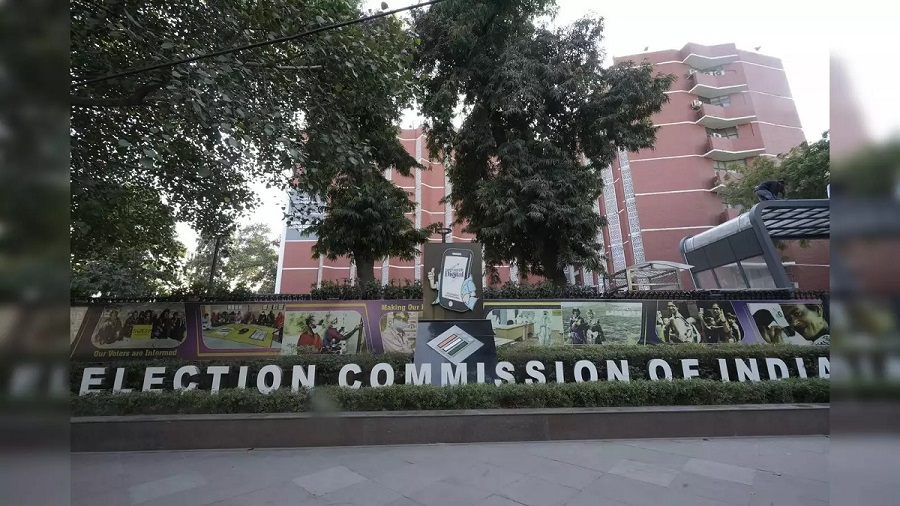Ahead of the Lok Sabha elections, the Election Commission of India issued an advisory on March 1 requiring political parties, candidates, and star campaigners to abstain from using religious symbols and communal passions, bringing up personal issues, demonizing women, and spreading false information. As per the advisory, any such act will be held to be in violation of the Model Code of Conduct (MCC) and would result in severe consequences. “No appeal shall be made based on caste or communal feelings of the electorate,” according to the guideline.
The aforementioned advisory comes just a few days before the model code is supposed to take effect following the announcement of the Lok Sabha and four state assembly elections later this month. As per a report of Deccan Herald, Chief Election Commissioner Rajiv Kumar also emphasized that political parties should encourage moral and polite political language that unites rather than divides and promotes ideas rather than insults, According to an official, the Commission’s guidance has now formally established the framework for moral political discourse. The said official, as per the report of Deccan Herald, also added the methodical approach to MCC violations has prepared the ground for a civilised campaigning. Notably, the ECI has cautioned the parties to uphold decency in public campaigning and to place more accountability on star campaigners and candidates, especially those who were issued notices in the past. Additionally, the ECI urged the parties to elevate the election campaign to a debate centred on issues and stated that neither the parties nor their leaders should mislead the electorate with claims that lack factual support. The advice extended to social media interactions, stating that it is improper to make or share posts that denigrate or disparage competitors or that are otherwise in poor taste.
Details about the advisory notice
The ECI stated in the advisory that leaders of political parties ought to stay away from making unfounded claims or remarks that are meant to deceive the electorate. It stated that critiques of other parties or their employees should be avoided if they are predicated on unsubstantiated claims or distortions.
“Unverified and misleading advertisements are not to be given to the media. Advertisements masquerading as news items are not to be given.”
Among others, Criticism of other parties or their workers on the basis of unverified allegations or distortions shall be avoided, was another issue flagged in the ECI advisory.
“No aspect of the private life, not connected with the public activities, of the leaders or workers of the other parties is to be criticized. Low-level personal attacks to insult the rivals shall not to be made.”
Observing numerous patterns and instances of declining political campaign discourse in the most recent elections, the ECI said it has sent out a further advisory to all political parties urging them to conduct public campaigns with the utmost decorum and restraint and to raise the bar to “issue-based debate”. Additionally, the ECI advised candidates to avoid participating in any behaviour or making any statements that can be seen as demeaning to women’s honour and dignity. Moreover, the ECI declared that no action would be taken that would exacerbate already-existing animosities, foster fear amongst communities, or exacerbate tensions between various castes, religious groups, or linguistic communities. It specifically mentioned the mention of houses of worship in the context of electioneering.
“No temples/mosques/churches/gurudwaras or any other place of worship are to be used for election propaganda of engineering. References which ridicule the relations between devotee and deity or suggestions of divine censure shall not to be made.”
Social media posts vilifying and insulting the rivals or posts in bad taste or which are below dignity are not to be posted or shared, it observed.
The Commission has put additional responsibility on star campaigners and candidates of political parties regarding the MCC violations.
“…put the star campaigners and candidates on a ‘notice’ in case of violations that followed the previously known methodologies during elections to avoid MCC”.
While acknowledging the need to keep a balance between the freedom of expression and level playing field, the advisory noted that the Commission has been following a self-restrained approach since the previous few rounds of elections, presuming that its notice would serve as a moral censure to the candidate or star campaigner.
It is essential to highlighted here that the Lok Sabha elections are due in March, April and May. It is expected that ECI may announce the schedule for polls by mid-March. However, the ECI is yet to confirm the dates. The aforementioned dos and don’ts mentioned by the ECI are essentially to maintain decorum in public campaigning which often slips to the ugliest in almost all the elections, be it for Lok Sabha for different State Assemblies.
A report in the Livemint provided that the Commission will assess any indirect MCC violations as per advisory as a fair basis to re-work the notices to be given in the forthcoming elections. For the Lok Sabha polls and election to four State Legislative Assemblies, all phases and geographical area of elections shall be the basis to determine “repeat” offences.
Related:
BJP’s Nitesh Rane gives authorities ultimatum of ‘fifteen days, threatens violence
Hate Speech in India: How to Promote Amity?
Is the Indian EVM & VVPAT System free, fair, fit for elections or can it be manipulated?
Poll bound states of Rajasthan and Chhattisgarh see hate speeches by BJP leaders prior to elections
